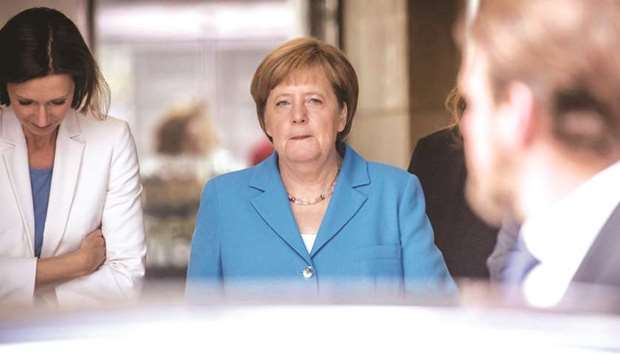German Chancellor Angela Merkel’s hardline interior minister Horst Seehofer is unhappy with an EU-wide deal she struck last week to reduce migration, sources told AFP yesterday, sharpening a crisis that threatens to bring down her conservative alliance.
After his Bavarian Christian Social Union (CSU) party spent weeks pressuring Merkel to toughen immigration and asylum policy, Seehofer complained to allies that he had endured a “conversation with no effect” with the chancellor on Saturday, the sources said.
CSU leaders gathered in Munich from 3pm (1300 GMT) to decide their response to the EU deal, while Merkel and her top lieutenants were set to huddle later in the day in Berlin.
On Friday European leaders agreed new measures to reduce immigration to the bloc and so-called “secondary migration” of asylum-seekers between countries.
Merkel, who has been in office since 2005, warned ahead of the summit that the issue of migration could decide the very future of the EU itself.
Earlier yesterday, Merkel told broadcaster ZDF that she would do “everything possible to achieve results that mean we can continue to assume responsibility for our country”, adding that “everyone knows the situation is serious” between her centre-right Christian Democratic Union (CDU) and their CSU allies.
Seehofer, who is CSU leader as well as federal interior minister, rejected her assessment that the EU-wide measures would “have the same effect” as his demand to turn away at the border asylum-seekers already registered in other EU nations.
If he orders border police to go ahead with the scheme in defiance of the chancellor, Merkel would be forced to fire him, in turn prompting a CSU walkout that would cost her her majority in parliament.
Backing for the long-time German leader came from leading figures in the CDU, with Hesse state premier Volker Bouffier warning that it would be “extremely ill-advised to take national measures without consulting others”.
“We should keep a cool head,” he added.
The Bavarian party’s discontent comes despite many of its long-standing migration demands appearing in the EU summit deal.
“Good decisions were taken at the summit, Europe has taken a big step forward,” CSU deputy chief Manfred Weber, who leads the centre-right European People’s Party (EPP) group in the European Parliament, said.
“The CSU has rocked Europe in the last few weeks,” he added.
Leaders agreed on Friday to consider setting up “disembarkation platforms” outside the EU, most likely in North Africa, in a bid to discourage migrants and refugees boarding EU-bound smuggler boats.
Member countries could also create processing centres to determine whether the new arrivals are returned home as economic migrants or admitted as refugees in willing states.
At the national level, Merkel also proposes that migrants arriving in Germany who first registered in another EU country should be placed in special “admissions centres” under restrictive conditions, according to a document she sent to the CSU and coalition partners the Social Democratic Party (SPD).
The document also outlined deals with 16 other countries to return already-registered migrants if had they reached Germany.
In a newspaper interview, Germany’s EU Commissioner Guenther Oettinger reminded fellow conservatives that Merkel’s “respect and authority” among member countries were “very valuable for Germany, no-one should destroy it”.
However, several central European nations including Poland, Hungary, the Czech Republic and Slovakia have denied that they had agreed to accept returned migrants.
The chancellor’s frantic last-minute diplomacy was ultimately prompted by the CSU’s fear of losing its cherished absolute majority in Bavaria’s state parliament.
The “Free State” with its beer-and-lederhosen Alpine traditions, powerful industries and impenetrable dialect has a more conservative bent than other German regions.
However, the CSU and CDU together form a centre-right force that has dominated national politics for decades.
Political stability was upset by Merkel’s 2015 decision to keep borders open to migrants and refugees arriving from the Middle East via the Balkans, Hungary and Austria.
Since then, more than 1mn people have arrived in Germany, while Merkel’s governments have repeatedly tightened immigration and asylum laws.
Nevertheless, the anti-refugee, anti-Islam Alternative for Germany (AfD) was propelled into federal parliament for the first time last year by outrage over immigration, leading to months of paralysis while Merkel struggled to find a workable coalition.
Opinion polls point to the AfD making a similarly spectacular entrance to Bavaria’s parliament in October.
Weeks of “Merkel-bashing”, however, have failed to help the CSU, as a Forsa poll last week showed around 68% of Bavarians backed Merkel’s quest for a Europe-wide answer to migration rather than Germany going it alone.

Merkel leaves the German public television ZDF office in Berlin after recording the traditional ‘summer interview’ yesterday, prior to a leadership meeting of her centre-right CDU party. Her CDU and its conservative Bavarian CSU allies held separate meetings yesterday to weigh the results of last week’s EU summit.
